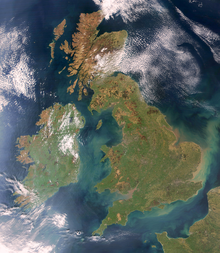| Revision as of 18:08, 21 September 2014 editAnomieBOT (talk | contribs)Bots6,583,626 editsm Dating maintenance tags: {{Fact}}← Previous edit |
Revision as of 00:44, 22 September 2014 edit undoSnowded (talk | contribs)Extended confirmed users, Pending changes reviewers, Rollbackers37,634 edits →Nationalism and unionism: best to remove the section, confuses 'sectarian' use of unionism in NI and Scotland with support for UK elsewhereNext edit → |
| Line 8: |
Line 8: |
|
|
|
|
|
It is characterised as a "powerful but ambivalent force in British politics".<ref>{{harvnb|Smith|Smith|White|1988|p=61}}.</ref> In its moderate form, British nationalism has been a ], emphasizing both cohesion and diversity of the people of the United Kingdom, its dependencies, and its former colonies.{{sfn|Motyl|2001|pp=64}} Recently however, ] nationalism and extremist nationalism has arisen based on fear of Britain being swamped by immigrants; this anti-immigrant nativist nationalism has been present in the ] and other extreme nativist nationalist and neo-Nazi movements.{{sfn|Motyl|2001|pp=64}} Politicians, such as ] ] of the Conservative Party and his direct predecessor ] of the Labour Party, have sought to promote British nationalism as a progressive cause.<ref>http://www.theguardian.com/politics/2014/jun/25/gordon-brown-independent-scotland-no-more-equal-progressive-alex-salmond-policies</ref><ref>Conservative Party leader David Cameron advocates liberal or civic British nationalism: "Being British is one of the most successful examples of inclusive civic nationalism in the world." http://www.conservatives.com/News/Speeches/2006/09/Cameron_I_will_never_take_Scotland_for_granted.aspx www.conservatives.com Official party site (26 September 2006)</ref> |
|
It is characterised as a "powerful but ambivalent force in British politics".<ref>{{harvnb|Smith|Smith|White|1988|p=61}}.</ref> In its moderate form, British nationalism has been a ], emphasizing both cohesion and diversity of the people of the United Kingdom, its dependencies, and its former colonies.{{sfn|Motyl|2001|pp=64}} Recently however, ] nationalism and extremist nationalism has arisen based on fear of Britain being swamped by immigrants; this anti-immigrant nativist nationalism has been present in the ] and other extreme nativist nationalist and neo-Nazi movements.{{sfn|Motyl|2001|pp=64}} Politicians, such as ] ] of the Conservative Party and his direct predecessor ] of the Labour Party, have sought to promote British nationalism as a progressive cause.<ref>http://www.theguardian.com/politics/2014/jun/25/gordon-brown-independent-scotland-no-more-equal-progressive-alex-salmond-policies</ref><ref>Conservative Party leader David Cameron advocates liberal or civic British nationalism: "Being British is one of the most successful examples of inclusive civic nationalism in the world." http://www.conservatives.com/News/Speeches/2006/09/Cameron_I_will_never_take_Scotland_for_granted.aspx www.conservatives.com Official party site (26 September 2006)</ref> |
|
|
|
|
==Nationalism and unionism== |
|
|
Nowadays, as in the past, unionist movements exist in ] and ]. These movements seek specifically to retain the ties between those areas and the rest of the ], in opposition to civic nationalist movements. Such unionist movements include the ], ] and the ]. In ] and ] the ], ] and ] parties support the Union, and although some supporters of those parties would consider their nationality to be Scottish or Welsh rather than British, most consider themselves to be both Scottish/Welsh and British.{{fact|date=September 2014}} |
|
|
|
|
|
|
==See also== |
|
==See also== |
It is characterised as a "powerful but ambivalent force in British politics". In its moderate form, British nationalism has been a civic nationalism, emphasizing both cohesion and diversity of the people of the United Kingdom, its dependencies, and its former colonies. Recently however, nativist nationalism and extremist nationalism has arisen based on fear of Britain being swamped by immigrants; this anti-immigrant nativist nationalism has been present in the British National Party and other extreme nativist nationalist and neo-Nazi movements. Politicians, such as British Prime Minister David Cameron of the Conservative Party and his direct predecessor Gordon Brown of the Labour Party, have sought to promote British nationalism as a progressive cause.



